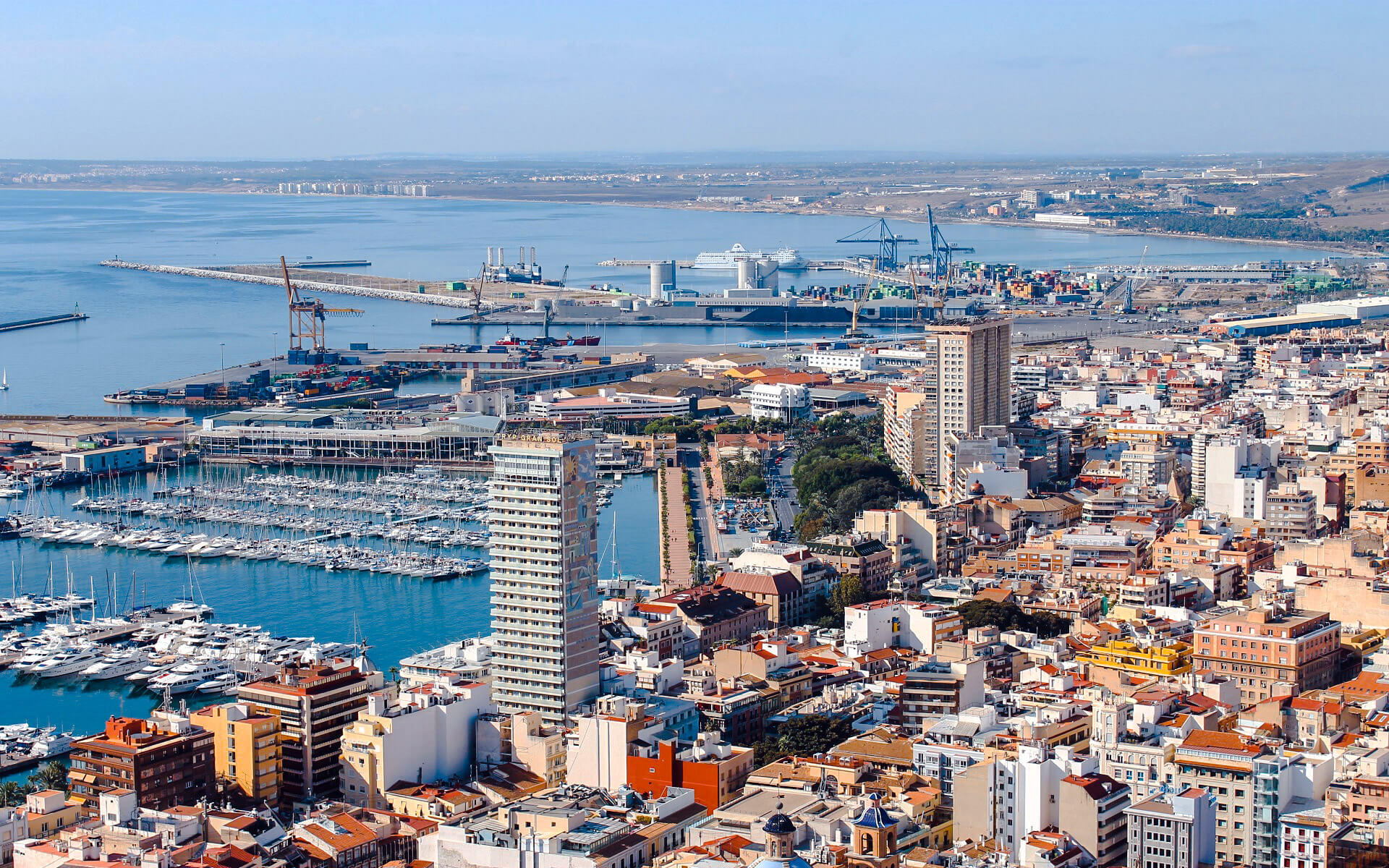The city is said to have been built by the Carthaginian commander Hamilcar Barca, who created the fortified town of Akra Leuka (Greek:, meaning ‘White Mountain’ or ‘White Point’), which is now Alicante. Later, it was taken by the Romans, who called it Lucentum. Alicante was an important Mediterranean commercial hub throughout the Middle Ages, exporting rice, wine, olive oil, oranges, and wool. More recently, the city has become a tourist centre for the Costa Blanca’s beaches.
BEACHES
Platja del Postiguet is located in the centre of the city (Playa de Postiguet). The sandy beach is popular throughout the day and becomes rather crowded in the evening when it is lit up by sodium street lights. These provide a strange appearance on the beach and breaking waves.
With a short trip by bus 22 or tram (L3, stop ‘Costa Blanca,’ you can reach the vast 7-kilometer-long Platja del San Juan (Playa de San Juan), which is regarded as one of the best in Spain.
The less busy Platja del Saladar (Playa del Saladar/Urbanova, bus 27) is situated south of the harbour, along the Alicante-Cartagena route. Platja dels Arenals del Sol (Playa de los Arenales) is little farther away, features sand dunes, and is less busy. An hourly bus service from the major bus terminal takes you to this beach.
FESTIVALS
Las Hogueras de San Juan is the city’s most prominent event. The festival takes place around the 20th of June, although residents start setting up approximately a week before. Massive structures (up to and including three floors tall) are built across Alicante and destroyed at the conclusion of the celebration on the night of the 24th to 25th, after the launch of the extremely huge “Palmera” firework from the top of the Castillo de Alicant. The explosion resembles palm tree leaves (hence the name, Palmera). This is the sign that starts the burning of the Hogueras monuments, which will persist until late at night. Following that, a week of night fireworks on the seashore will take place. You won’t have to walk far to discover music, drinks, and dancing throughout the event, which normally lasts until the early hours.
Carnival (in February–March, right before Lent) features parades of individuals dressed in disguise and open-air performances (yes, if the weather permits!).
, Holy Week (with parades of religious brotherhoods carrying representations of Jesus Christ, Holy Mary, and so on), and Santa Faz (second Thursday following Good Friday), when a major pilgrimage/walk to a nearby town with a relic containing an image of Jesus is held. As in the rest of Spain, on the 6th of January, there is a procession in honor of the Three Wise Men who loved Youngster Jesus, in which every child participates (it is the equivalent to Santa Claus in the Spanish culture).
The Moros y Cristianos event takes place in numerous small villages in the Alicante area in October. The celebration commemorates the re-conquest of each town by Christian monarchs of the area by Islamic troops. Locals dress up as Medieval Moorish and Christian soldiers and knights in colorful costumes. In certain public processions, live camels and elephants may be seen. Temporary wooden castles are created in certain regions, and simulated wars are fought. Loud gunpowder arquebuses are fired into the air, and fireworks may linger all night.
TOURIST INFO
Tourist Info Alicante, Rambla Méndez Núñez, 41 (near Plaza de San Cristobal), +34 965 200 000, fax: +34 965 200 243.The main tourist office is open all year and offers free maps and brochures.
- Tourist Info Alicante Ayuntamiento, Plaza del Ayuntamiento, 1 (in the city hall), +34 965 149 219, e-mail: turismo@alicanteturismo.com. M-F 09:00-14:00 16:00-18:00, Sa Su 10:00-14:00.
- Tourist info Alicante Platja del San Juan, Avda de Niza, s/n (Playa de San Juan / San Juan Beach), e-mail: turismo@alicanteturismo.com. Jul-Aug: daily 10:30-14:30 17:30-20:30.
- Tourist Info Alicante Renfe, Avda de Salamanca, s/n (in the main train station), +34 965 125 633, e-mail: turismo@alicanteturismo.com. M-F 09:30-14:00 16:30-19:00, Sa Su 10:00-14:00.
- Tourist info Alicante Aeropuerto, Aeropuerto El Altet, +34 966 919 367.Tu 09:00-19:00, W-F 09:30-15:00.


